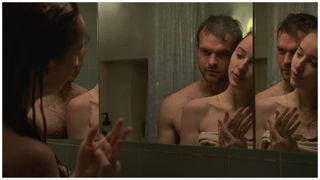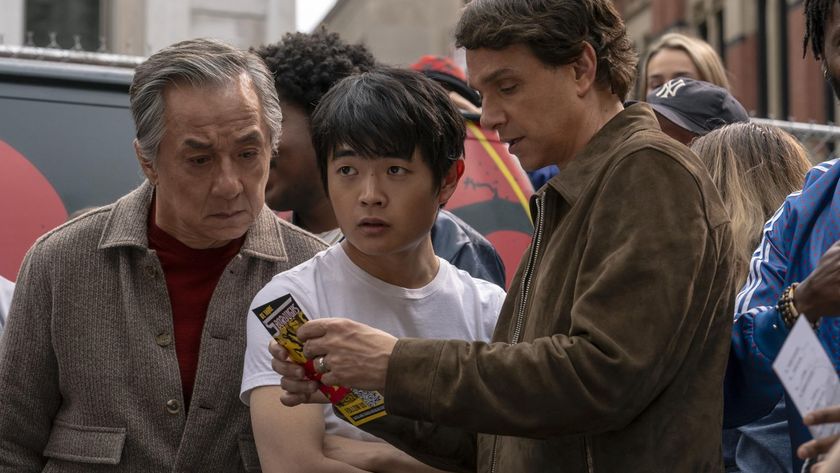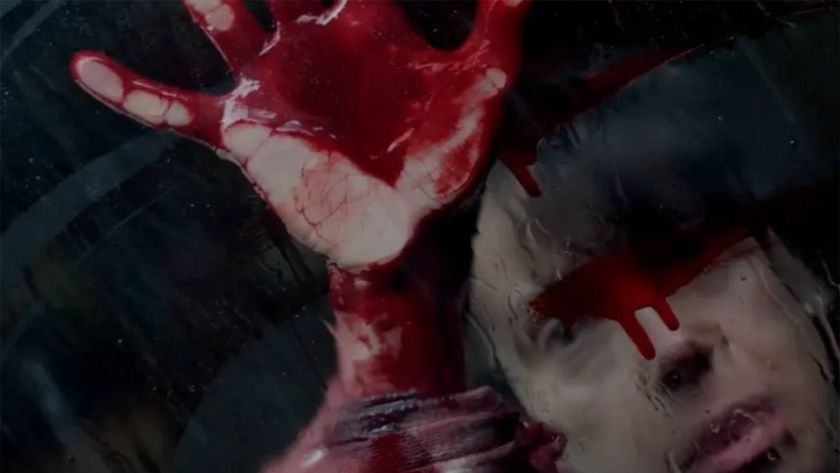12DOVE Verdict
A gripping first feature from an impressive new talent that will get people talking both at work and at home.
Why you can trust 12DOVE
Chloe Domont’s taut, sleek, and remorseless adult drama sold for a reported $20 million at this year’s Sundance Film Festival. Yet that is chicken feed next to the multi-million-dollar deals its aspiring analysts broker down at One Crest Capital, a dog-eat-dog Wall Street hedge-fund firm that represents plutocracy at its most ruthless and cut-throat.
This is no place to find a friend, let alone start a relationship. But Luke (Alden Ehrenreich) and Emily (Phoebe Dynevor) are conducting a clandestine one regardless, a violation of strict company policy that could mean both their asses should it ever come to light.
This attractive young pair only have eyes for each other at the beginning of the film, sneaking away from a family wedding to have a steamy quickie in the washroom that leads to an unexpected proposal of marriage. And yet their sights are set on a holier grail: the chance of a promotion to the coveted status of Portfolio Manager, with all the power and the riches that come with it.
Having served his time at the financial coalface, Luke believes the step up the ladder is his by right. To both their surprises, though, it is Emily who gets the gig: a kick in the teeth that Luke clearly feels keenly, for all his smiling protestations to the contrary.
With a clinical efficiency that would surely win her the admiration of Emily and Luke’s hard-as-nails superior Campbell (Eddie Marsan), Domont (TV’s Billions, Clarice) deftly shows how Emily’s advancement eats away at her partner’s fragile sense of worth. Indeed, it isn’t long before Luke feels the urge to undermine her, primarily by recourse to the age-old sexist cliché that she couldn’t have climbed the greasy pole of success through aptitude and competence alone.
Sound familiar? It surely will to any viewer with experience in the workplace. Domont’s skill, however, is at showing how such codified double standards mean Emily cannot win, no matter what she does. If she tags along with her boorish colleagues for an evening of leery drinks at a strip club, she is accused of exploiting her sexuality. ("You don’t look like one of the boys,’ snaps Luke viciously. ‘You look like their hooker!") But if she endeavours instead to be the supportive consort by acting on Luke’s iffy investment tips it’ll blow up in her face, earning her a $25 million shortfall, Campbell’s disdain, and a contemptuous ‘dumb bitch’ insult.

Such are the fault lines that become exposed when love and ambition clash, and masculinity becomes emasculated. Indeed, there’s a whiff of A Star Is Born in how Domont’s screenplay juxtaposes Em’s rising tide with Luke’s narrowing options, the latter’s increasing reliance on second-hand wisdom gleaned from a fiscal guru’s self-help book (Behind the Numbers: the Art of Perception) only adding more distance to the yawning gulf between them.
In a neat visual counterpoint that may go unnoticed on first viewing, production designer Steve Summersgill has the walls of the couple’s small Manhattan apartment move incrementally inwards to heighten the atmosphere of constricting claustrophobia. The transparent glass partitions at the office they share, meanwhile, ensure there is nowhere to hide when things turn bad – a point amusingly highlighted in an early scene in which the newly ousted former PM takes a golf club to his computer while his underlings watch a video about One Crest’s reputation for integrity.
Costumes play a part, too, as Emily junks her old daywear in favour of the sorts of suits and turtlenecks once popularised by the disgraced Elizabeth Holmes. Ultimately, though, it’s the actors wearing the clothes that give Fair Play its sizzle. After her performances in Netflix’s Bridgerton and pottery biopic The Colour Room, Dynevor displays a startling sliver of steeliness with a turn that’s a world apart from Shondaland.
Yet she is matched by a resurgent Ehrenreich, who – hot off his roles in Cocaine Bear and Oppenheimer – fearlessly embraces a character that demands he visibly diminish on camera, most humiliatingly in a scene where he prostrates himself before Campbell for a position no longer open.
It’s regrettable perhaps that the plot’s later developments, which include a full-circle confrontation in another unoccupied restroom, tip the film into erotic-thriller territory. Yet Domont is too smart to go full Fatal Attraction, largely restricting the violence in the piece to the emotional and the verbal.
Towards the end, the ever-excellent Marsan delivers a speech in which he coldly deems concepts such as accountability and blame to be of inconsequential irrelevance. Self-interest is what matters in the domain Fair Play inhabits, and when your elevator is going up the last thing you want is a passenger.
Fair Play is in selected UK and US cinemas on September 29 and on Netflix from October 6.
More info
| Genre | Thriller |
Neil Smith is a freelance film critic who has written for several publications, including Total Film. His bylines can be found at the BBC, Film 4 Independent, Uncut Magazine, SFX, Heat Magazine, Popcorn, and more.














